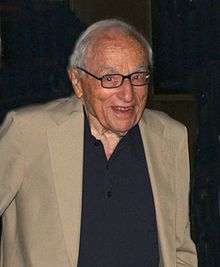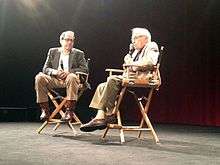Walter Bernstein
| Walter Bernstein | |
|---|---|
 | |
| Born |
August 20, 1919 Brooklyn, New York |
| Occupation | screenwriter and film producer |
Walter Bernstein (born August 20, 1919) is an American screenwriter and film producer who was blacklisted by the Hollywood movie studios in the 1950s.
Early life
Bernstein was born to a Jewish family[1] Brooklyn, New York, the son of Hannah (née Bistrong) and Louis Bernstein, a teacher.[2] He attended Dartmouth College, where he got his first writing job, as a film reviewer for the campus newspaper, and where he also joined the Young Communist League. He graduated from Dartmouth in 1940.[3]
Career
In February 1941 Bernstein was drafted into the U.S. Army. Eventually attaining the rank of Sergeant, he spent most of World War II as a correspondent on the staff of the Army newspaper Yank, filing dispatches from Iran, Palestine, Egypt, North Africa, Sicily and Yugoslavia.[3]
Bernstein wrote a number of articles and stories based on his experiences in the Army, many of which originally appeared in The New Yorker. These were collected in Keep Your Head Down, his first book, published in 1945.
Bernstein first came to Hollywood in 1947, under a ten-week contract with writer-producer-director Robert Rossen at Columbia Pictures. Following that stint, he worked for a while for producer Harold Hecht, which resulted in his first screen credit, shared with Ben Maddow, for their adaptation of the Gerald Butler novel Kiss the Blood Off My Hands for the 1948 Universal film. He subsequently returned to New York, where he continued writing for The New Yorker and other magazines, and eventually found work as a scriptwriter in the early days of live television. In 1950, because of his numerous left-wing political affiliations and related activities, his name appeared in the notorious publication Red Channels, and as a result he found himself blacklisted. Throughout the 1950s, however, he managed to continue writing for television, both under pseudonyms and through the use of "fronts" (non-blacklisted individuals who would permit their names to appear on his work). In this manner, he contributed to several notable TV programs of the era, including Danger, the CBS News documentary series You Are There and the mystery series Colonel March of Scotland Yard. (It has been incorrectly stated in some sources that Bernstein's blacklisting resulted from "unfriendly" testimony given to HUAC in 1951, but in fact he was not subpoenaed by the Committee until the late 1950s, and never actually testified.)[4]
His screenwriting career began to emerge from the blacklist when director Sidney Lumet hired him to write the screenplay for the 1959 Sophia Loren movie That Kind of Woman. From then on Bernstein was able to work openly on films such as Paris Blues (1961) and Fail-Safe (1964). He also contributed, without receiving credit, to the screenplays of The Magnificent Seven (1960) and The Train (1964), and was one of several writers who worked on the script for the ill-fated Something's Got to Give, which was left uncompleted at the time of the death of its star, Marilyn Monroe, in 1962.

Paris Blues marked his first feature film collaboration with director Martin Ritt, a friend since the 1940s (and himself a victim of the Hollywood blacklist); they subsequently worked together on The Molly Maguires (1970), which Bernstein also co-produced with Ritt, and The Front (1976). The latter film, a dramatic comedy about a restaurant cashier (played by Woody Allen) with no real talent or political convictions who is hired to act as a "front" for blacklisted television writers during the 1950s, earned Bernstein an Academy Award nomination for Best Original Screenplay and the WGA Award for Best Drama Written Directly for the Screen. The same year, Bernstein also made a cameo appearance in Allen's film Annie Hall.
The following year he was nominated for the WGA for Best Comedy Adapted from Another Medium for Semi-Tough and again in 1979 he was nominated for a BAFTA Award for Best Screenplay for Yanks. In 1980, he stepped behind the camera for his only feature film as a director, Little Miss Marker, based on the Damon Runyon story of the same name. He also wrote and directed one segment of the 1991 made-for-TV movie Women & Men 2: In Love There Are No Rules.
In 1996, Bernstein published the book Inside Out: A Memoir of the Blacklist. In his memoirs, he tells about joining the Young Communist League at Dartmouth College in 1937, and the Communist Party itself the year after he left the U.S. Army.
In 1994, he received the Ian McLellan Hunter Memorial Award for Lifetime Achievement in Writing, from the Writers Guild of America East. In 2008, the WGAE presented Bernstein with their Evelyn F. Burkey Award, given "in recognition of contributions that have brought honor and dignity to writers everywhere."
Bernstein currently serves as a visiting instructor and screenwriting thesis adviser at New York University's Tisch School of the Arts in the Department of Dramatic Writing.[5]
References
General references
- Harvey Klehr, John Earl Haynes, Venona: Decoding Soviet Espionage in America (New Haven: Yale University Press, 1999), pgs. 238–240, 343, 430. ISBN 0-300-07771-8
Inline citations
- ↑ McGillian, Pat (1997). "Walter Bernstein: A Moral Center". University of California Press. Retrieved June 11, 2016.
- ↑ "Walter Bernstein Biography (1919–)". Film Reference. Retrieved June 11, 2016.
- 1 2 Bernstein, Walter (1945). Keep Your Head Down, Viking Press. Book jacket text
- ↑ Bernstein, Walter (1996). Inside Out: A Memoir of the Blacklist, Alfred A. Knopf, New York: Knopf, ISBN 0-306-80936-2
- ↑ "Faculty Directory". Tisch School of the Arts. Retrieved January 16, 2013.
External links
| Wikimedia Commons has media related to Walter Bernstein. |
- Walter Bernstein at the Internet Movie Database
- Walter Bernstein interview video at the Archive of American Television
- Ávila, Molly Rose; Zucker, Gregory (July 11, 2011). "In Conversation: Red Memories". The Brooklyn Rail.